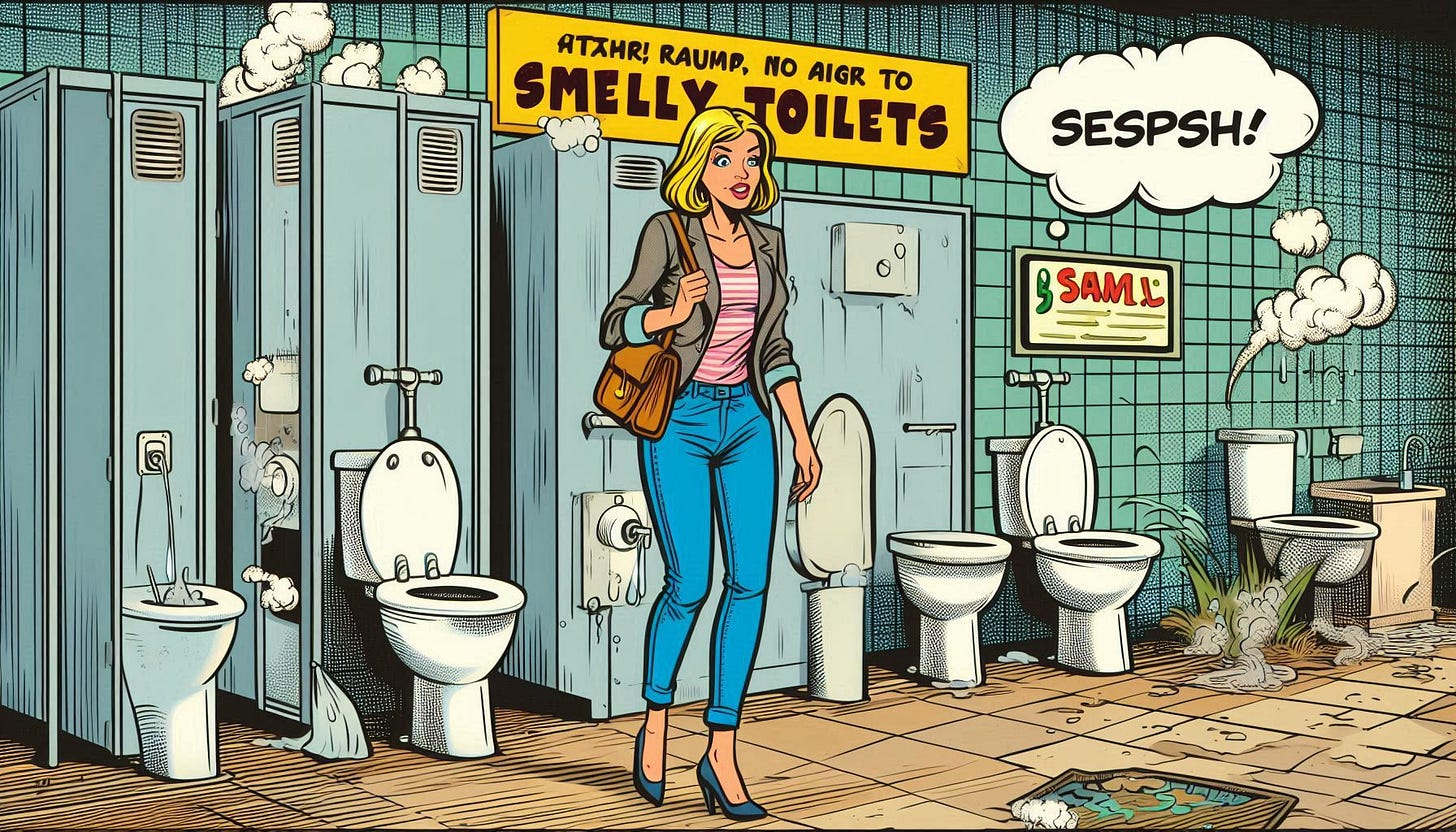Happy New Year to you all!
Although I appreciate that, for many, Christmas is a frantic and stressful time of year, my own circumstances mean that I usually have a few days of peace and quiet before New Year, a period of time that expands in my mind the more I look forward to it, until I arrive at 27 December with expectations of enjoying something akin to a state of semi-retirement.
Those thoughts are never realistic, but last year the time seemed to evaporate more quickly than ever, and with it went my plans to enter 2025 with some of the previous year’s unpublished ideas fully developed and polished, ready to present to you, my loyal readers, in January.
Which is a roundabout way of saying: I was hoping to offer you something other than what follows, based on a Christmas of catching up with books, films and writing over the break. But none of that happened, so I had to write about the last two things that were on my mind at the end of 2024, one of which was the state of my work’s toilet facilities.
Please accept my sincere apologies.
–
Recently, my employer moved into a swanky new building. It’s the first time I’ve ever actually worked in a modern office: when I worked in higher education, the facilities were either run-down or neglected, and on the few occasions that they were revamped or expanded, any superficial impressiveness was quickly undermined by shoddy workmanship or mildly comical decision-making during the design phase. The crack that immediately appeared in a prominent place on the new main building façade, or the idea that the library alarm warning would sound better with the addition of a recorded bollocking delivered, in unconvincing fashion but at high volume, by the head librarian, are two that spring to mind.
The toilets for staff were the same ones that the students — or indeed anyone wandering in off the street — could use, and a combination of the generally low standards of hygiene maintained and a couple of incidents that suggested our lax campus security arrangements had attracted the interest of local perverts prompted frequent protestations from colleagues that the university simply must do something to provide discrete loos for its workers. When this didn’t work, some of these colleagues started using the disabled toilets instead, until they were quickly also rendered unusable by the general increase in traffic.
To be frank, I didn’t really mind the toilets — not because the sights, sounds and smells weren’t frequently appalling, but because they were completely in keeping with plummeting standards elsewhere: the inability to provide or maintain decent lavatories was only to be expected of an institution with inadequate classroom space, teaching staff, administrative support or catering facilities. I did, however, draw the line at being asked about these things by students while they were standing next to me at the urinals.

Fast forward a few years, and I’m being shown around our all-new office space, which boasts facilities — including toilets — that are much nicer than anything I’ve been used to in the past. The showers even look nicer than the one we have at home, and if it wasn’t for my basic aversion to early morning starts, and the general insanity of such a strategy, I’d have been making plans to start getting an earlier train in order to use them before work.
However, a few weeks in, it appeared that all was not well. An all-staff email appeared one morning, noting that on a number of occasions the facilities had been left in ‘an unacceptable state’ and including several handy reminders about the presence of a flush mechanism and a toilet brush in each cubicle.
Now: these toilets are gender neutral, which was not especially controversial in the ways that gender neutral toilets can be controversial. (‘That’s the world we live in now,’ said the building manager giving us the tour, in a manner that indicated an awareness of possible conversations that people might want to have about this topic, and his lack of interest in participating in such conversations, without stating an opinion one way or the other).
However, the issues that had obviously led to the all-staff email soon caused a schism, along gender lines. The gist of it was that, since the men were obviously weeing on the floor and leaving big smelly atrocities in the bowl while caring little about cleaning up after themselves, the toilets should be informally segregated again.
I am a man, and having used male toilets all my life, I had absolutely no issue with the finger of suspicion being pointed in our direction, even without — I assume — any direct evidence. And, having previously shared toilets with male and female family members and housemates over the years, and being relatively well educated on the relevant issues, I hadn’t really worried about any blame being attached to me.1
However, I soon realised that, in some eyes (and noses), I was indeed already guilty by association. Paranoia soon set in: was that lady from finance really frowning at me as we passed each other in the shared space of the toilet corridor, or was it my imagination? Probably the latter, since I was on my way in: I hadn’t even done anything yet. But I was uneasy, and worried about cracking, misinterpreting a meaningless glance as an accusation, and suddenly exclaiming, ‘IT’S NOT ME, OKAY? I’M CLEAN AND TIDY!’ at a volume that would justifiably prompt the commencement of disciplinary proceedings.

The size of the company is perfect for creating such an atmosphere: it’s not so big that there’s absolutely no chance of ever tracking down the perpetrators, but it’s not so small that we’re ever going to be called into a meeting room for a Poirot-style unmasking of the villain, either. No-one is anonymous, and everyone a suspect. I think it’s even got to me: here I am, assuming that people are looking for individuals to blame rather than simply expressing general disgust and a desire for people to do better.
Those who leave toilets in a mess are, it seems, just a fact of life. It only takes a relatively small number of inconsiderate people to cause significant damage, and the assumption is that it’s not a problem among the wider population in general.
The same could arguably be said of people who leave a mess of a different kind: on the internet, in comments sections or on social media. After the kinds of stories that have rightly dominated the headlines in recent weeks — a trend that appears set to only get worse — I don’t want to risk appearing to make the argument that the often ugly nature of online discourse isn’t relevant to the real world.2
But the truth is that I’ve never actually had a conversation with someone in which the subject of whether either of us are active ‘below the line’, or elsewhere, has ever been discussed. Just as toilet-related suspicions could prompt someone to look around the room and consider who might be a likely mess-leaver, possible candidates for angry messages to celebrities and diatribes under newspaper articles probably aren’t that hard to find, if you’re willing to make unfair assumptions about people. But, like a flailing contender on The Traitors, with absolutely no evidence to go on, I’d probably be wrong.3
I haven’t ever Googled ‘What percentage of people don’t know how to clean up after themselves in the toilet?’ but I have searched for ‘What percentage of people leave online comments?’ 4 because the latter genuinely does fascinate me. Having been an internet user since the late-90s, angry and eccentric behaviour has always been a feature: what I can never quite get my head around was my historic (and erroneous) assumption that the weirdness of the internet would eventually be diluted by more normal people using it, rather than having the weirdness overtake them.
And so, the historic dismissal of troll-like behaviour as the actions of basement-dwelling nerds and losers no longer seems relevant, given that oddball online behaviour is now indulged in by a broader cross-section of society. It’s also become harder to avoid.
Still, having manoeuvred myself away from social media, long avoided comments sections, and never worked out what exactly Reddit is, getting sucked into debates involving people I don’t know about things I don’t really feel strongly about is, thankfully, not a common occurrence.
(I do slip occasionally, voluntarily subjecting myself to torrents of unsustainable invective associated with news stories about football, or wondering why people leave comments underneath the expert advice columns in The Guardian and The Observer, particularly those that address the letter writer directly, in the expectation that what the person with a major life problem wanted was not the sage counsel of an expert but a big stressful blob of subjective and contradictory interventions from random internet strangers. This isn’t AITA!5)
One of the reasons online discourse often seems so overwhelming is that it doesn’t take a lot of people shouting to feel like the whole world is joining in. Just as it doesn’t take many irresponsible colleagues to ruin the toilets for the whole workforce, a relatively small proportion of online commenters can soon pollute the atmosphere in a way that makes you more than slightly depressed and fearful for the future of humanity.
Toxic online comments are like toxic work bogs. You might be briefly exasperated, despair at whether this is representative of some kind of moral decline and wonder how many people behave like this (and why), but the answer is the same. It’s happening. Someone is doing it, but you’re not going to find out who, or be able to stop it. All you can do, it seems, is to try and avoid it, while making sure you don’t leave too much of a mess of your own.
(Semi-relevant addendum: I’ve decided to open up comments on BBWBR. I initially turned them off because it seemed like the thing that made Substack a newsletter rather than a blog, but I think turning them on and allowing people to ‘like’ posts might make some kind of positive difference in terms of helping new people to find it. Or it may not make any difference at all.)
Look: nobody’s perfect, and I’m not saying there haven’t been one or two nightmarish sitcom-style scenarios at other people’s houses, but in general I do know how things should be left.
Or get into any of the serious topics of the day at all, really.
The Traitors is on! I like it! It’s good! Could I have written about The Traitors this month, instead? Er, something about what the show tells us about modern British society? On second thoughts, I think that would have been even worse than this stuff about bogs.
Google, even with all of the power of AI, apparently has no real answer to this question. Between that and the terrible pictures generated by MS Designer, I’ve really felt let down by technology this week.
I do know what Reddit is, really: I’m not that old.




